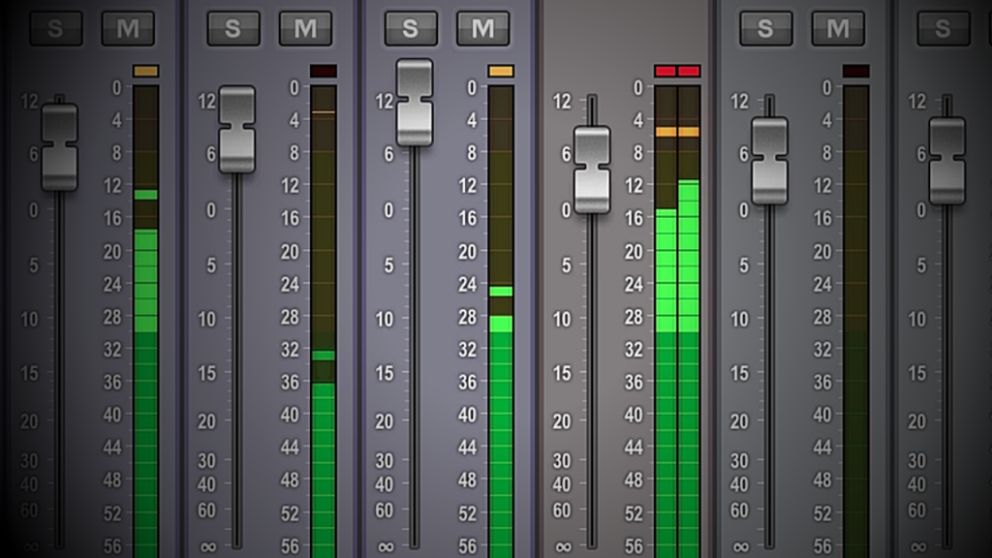Stop Recording So Hot Into Your DAW
Feb 12, 2014If you are recording in a modern home studio comprised of a computer, an audio interface, and software, then one of the simplest things you could do to make your tracks sound better is to stop recording so hot into your DAW. That’s right, many of you are recording signals that are way too loud, giving you worse sound and for no real reason.

Digital Vs. Analog
The confusion is rooted in old analog workflows that simply don’t carry over into the digital world. Now, most of what we know of great recording technique comes from the analog world, and it’s really helpful. Nothing about mic placement, arrangement, room acoustics, performance, and effects has really changed in the digital world.
Audio is audio and sound is sound, and the great engineers of the last 50 years still know what they are talking about and we would do well to pay attention to how these masters of their craft captured the sounds that they did. Technique is everything, the medium might change, but philosophy of recording doesn’t. With two exceptions.
Noise Floor And Clipping
Two things that are very different in digital than in analog are the noise floor and clipping. In the days of recording to tape there was so much noise that the engineers were fighting against. Console noise, tape hiss, you name it. The goal was to record your levels loud enough that your signal to noise ratio was high and you wouldn’t hear much of that noise in the final product. These days with a simple digital home studio we have a super quiet noise floor so this is practically a non issue.
Secondly is the clipping situation. Recording as “hot as you could without clipping” was perfectly suitable advice for those recording to through consoles and to tape. Why? The hotter you pushed the console and hit the tape, the more likely you were to get saturation (compression) that sounded pleasing. In fact, it’s been called “warm” by audio people because that is very much how the human ear perceives the subtle effect of analog saturation.
Unfortunately for us in the digital world, computer software doesn’t give us “warm” saturation when we clip. In fact, that little clip light in your DAW is the end of the line for your audio. The computer crushes the signal giving you a metallic and horrible sound.
Don’t Go There People
All of this discussion brings be to the point at hand: please, whatever you do, don’t record your tracks so hot that they are even close to clipping in your recording software. You gain nothing from tracking that loud since there is no real noise floor to overcome. You can record much more conservatively, say 50% or 70% up the meter and still have a very useable and musical signal.
Plus the closer you get to hitting that 0dBfs clip light on your meter the closer you get to nastiness. Why play with fire? It’s just too dangerous, and a sad waste of potentially a great sounding track. Especially if you plan on adding plugins to these tracks in the mix. You’re way past the digital sweet spot at that point.
Turn The Gain Knob Down
So here’s the simple suggestion, when recording simply aim to get your signal hitting half way up the meter, maybe a bit more when it peaks, and leave it there. Remember that the signal is actually controlled by the gain knob on your preamp or audio interface, not the fader in your DAW. That fader controls the mix of the signal AFTER it’s been converted to digital. Not how hot the signal is hitting your converters.
So the place to actually control the level is on your physical preamp or interface. Turn that sucker down. Then if you can’t hear enough of the signal you can turn the fader in your DAW up or turn your speakers up. You can monitor the signal hotter, just as long as you are actually recording at a conservative level.
Your tracks will sound musical and full, without the fear of hitting that nasty digital clipping that ruins so many tracks these days.
Discover The 6 Steps for Creating a
Radio-Ready Song from Scratch"
Enter Your Email Below To Receive The Free 17-page PDF,
"6 Steps To A Radio-Ready Song"
We hate SPAM. We will never sell your information, for any reason.

